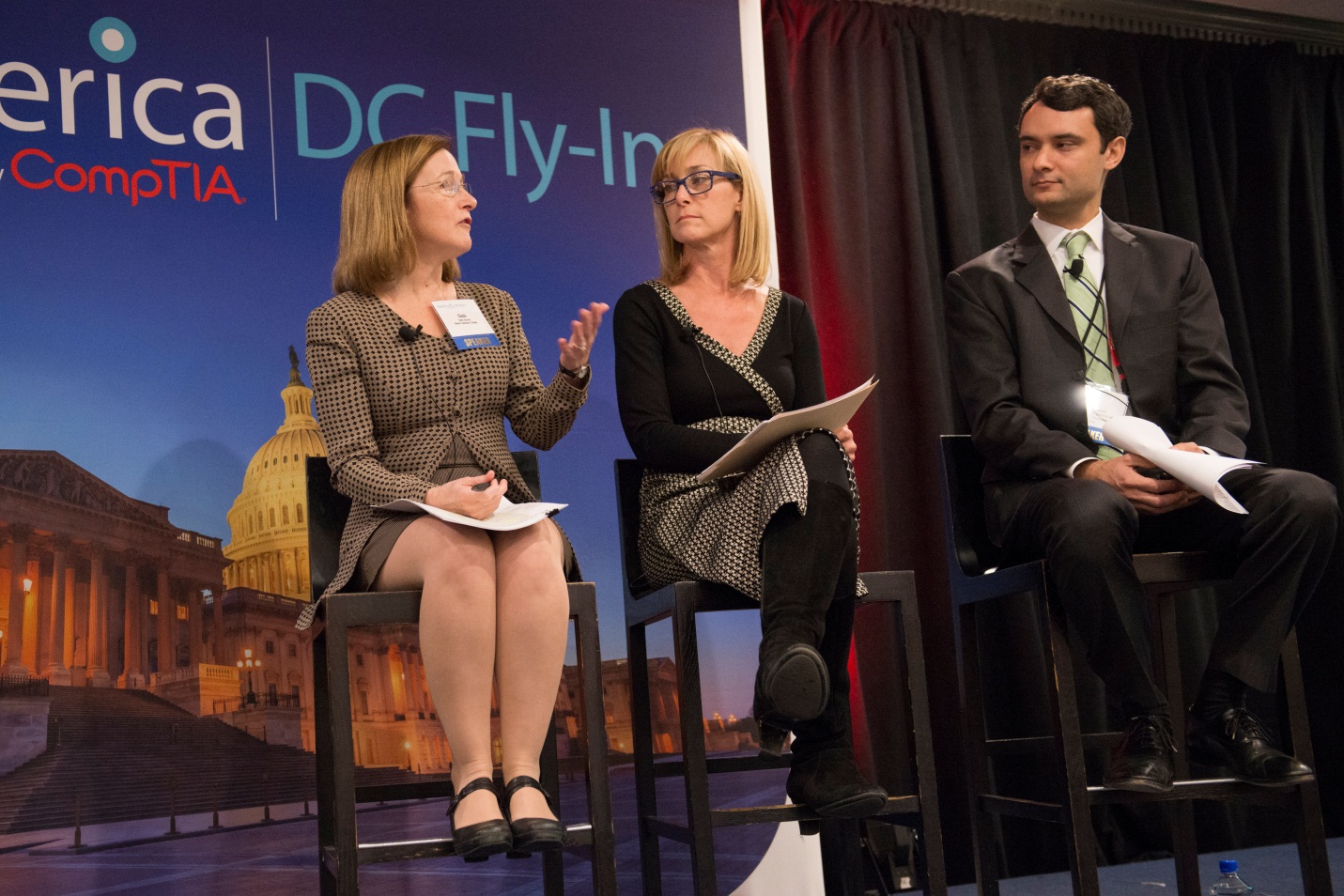 Day two of the 2015 TechAmerica D.C. Fly-In, organized by TechAmerica — the public sector and public advocacy department of CompTIA and the Technology Councils of North America (TECHNA) — was as informative as the first, starting off with the Capitol Hill Speaker Series in the Cannon House Office Building.
Day two of the 2015 TechAmerica D.C. Fly-In, organized by TechAmerica — the public sector and public advocacy department of CompTIA and the Technology Councils of North America (TECHNA) — was as informative as the first, starting off with the Capitol Hill Speaker Series in the Cannon House Office Building.
Speakers that morning includedU.S. Rep. Marsha Blackburn (R-Tenn.), Ryan Burke, policy adviser for the National Economic Council, Chairman Bob Goodlatte (R-VA), Commissioner Ajit Pai of the Federal Communications Commission (FCC), Commissioner Julie Brill of the Federal Trade Commission (FTC), and U.S. Rep. Zoe Lofgren (D-Calif.).
Data Security and Privacy
Blackburn started the morning with a discussion of data security and privacy and the need for businesses to be increasingly vigilant about protecting their data. “It’s no longer a question of if, but when will your company be a victim to a security breach,” she said.
She discussed her work on data security breach legislation, specifically the Secure IT Act designed to improve America’s ability to respond to our escalating cybersecurity challenges. The act’s five main components include: allowing the government and the private sector to address cyber threat information in a more transparent fashion; reforming how our government manages its own information systems; creating new deterrents for cyber criminals; prioritizing research and development for cybersecurity initiatives; and streamlining consumers’ ability to be notified when they are at risk of identity theft or financial harm.
Blackburn also used the forum to oppose net neutrality regulations. “The Internet is not broken and doesn’t need to be classified as Title II with regulations that will lead to billions of dollars in new fees and taxes,” she said. “The Internet doesn’t need to be taxed, government doesn’t need to be involved and we don’t need an activist FCC that wants to put the Internet under control.”
IT Industry Updates
Ryan Burke, policy advisor for the National Economic Council (NEC), spoke about the council’s work to fill in-demand jobs in the IT industry. In the spring, the NEC plans to launch a new program focused on job readiness vs. pedigree, high-quality training, like coding boot camps, and job matching with more than 20 communities across the country. The NEC is currently seeking partners for this program.
Next up, Chairman Goodlatte provided an update on several tech sector bills including the Innovation Act that would fight patent trolls — this bill was introduced last year and was passed by the House but was never passed by the Senate. Goodlatte plans to reintroduce the Innovation Act this year. Goodlatte also said he continues to work on high skilled immigration reform. “The immigration system is broken, status quo is unacceptable. The President’s actions make it very difficult to do immigration reform,” Goodlatte said. “We need legislation passed that supports high skilled immigrants who will help our economy grow and create jobs.”
FCC Commissioner Ajit Pai was one of two Republicans on the five-member commission opposing Chairman Tom Wheeler's net neutrality plan. Speaking on net neutrality and the open Internet, he held the 332-page Net Neutraility plan from President Obama that will be made public later this month. While he wouldn’t reveal the report’s contents, he did oppose heavy-handed Title 2 Internet regulations and discussed the need to open up broadband competition and to push for more broadband-friendly policies. In his opinion, more licensed and unlicensed spectrum should be made available for the marketplace and is in favor of a 5 GHz Spectrum Band as test bed for wireless innovation.
The Internet of Things
Later in the day, FTC Commissioner Brill discussed data privacy and the new FTC staff report on the Internet of Things. She highlighted that the report calls for self-regulation by companies that gather data and recommends equipping more devices with security measures, updating security with patches as needed, and limiting the amount of information companies gather. Popular devices that gather and transmit information about exercise, eating and sleep patterns increasingly threaten privacy and security. She also has concerns about consumer segmentation, as well as consumer notification. She stressed wanting to have conversations with industry on how to implement best practices and felt that a Consumer Privacy Bill of Rights is necessary in these times.
The morning rounded out with Rep. Zoe Lofgren, who is not optimistic that immigration reform will succeed in this Congress and noted high-skilled immigration proposals — including Sen. Orrin Hatch’s I-Squared Act — would overcome opposition. Still, Lofgren said she is working on a bill to extend an immigration program aimed at bringing in foreign investors. That EB-5 visa program is set to expire in September. “I think there is bipartisan support for the program,” she said.
The remainder of the day was devoted primarily to visits with Congressional offices. Attendees called on Congress to enact a permanent ban on multiple and discriminatory taxes on access to the Internet, as provided in H.R. 235, the Permanent Internet Tax Freedom Act. This legislation supports economic accessibility to the Internet by making permanent the current and temporary ban on taxation of Internet access charges by federal, state and local governments.
The D.C. Fly-In brought more than 140 technology executives and business owners representing 29 states to Washington, D.C., on Feb. 10 and 11.
Lana Sansur covers advocacy and public relations for TechAmerica, the public sector and public policy division of CompTIA.



0